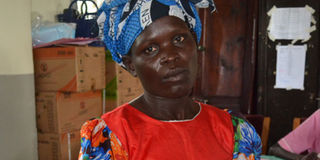Freedom from fistula

Mary Alyao is happy to be able to associate with others, thanks to a fistula operation. Photo by Sandra Janet Birungi
Twenty eight-year-old Mary Alyao is happy that after a risky but successful operation, she is free from frequenting the toilet and the stench of urine that had come to define her life.
A total orphan, Alyao’s life hit the dead end when she got pregnant in her early 20’s. She started living with the man responsible for her pregnancy but everything changed after she suffered fistula and lost her baby during delivery.
“I gave birth from a health centre III in Amuria District but developed complications and lost my baby. After birth, I went back home to my husband and that is when I realised I was leaking urine. He soon left me for another woman and I stayed with my mother-in-law,” Alyao said. She had developed fistula.
Her mother-in-law took care of her for three days before chasing her away. Desperate, Alyao went to stay with a friend who took care of her for some time before she heard of the corrective surgery offered at Soroti Regional Referral Hospital.
Treading dangerous path
According to Dr Fred Kirya, a senior consultant surgeon and urologist at Soroti hospital, Alyao had undergone two surgeries before going to Soroti for the one which saw the hole get closed successfully.
Martha Ibeno, the programme manager at Terrewode, an NGO which helps rehabilitate fistula survivors, says after receiving surgery, women are not allowed to have sex for at least six months to allow the healing process to occur but that did not happen for Alyao.
“The friend she was staying with told her she needed to start working to make ends meet and she was introduced to commercial sex before the six months window period ended. The hole in the bladder reopened,” Ibeno says.
Angry and sad all over again, Alyao had to leave her friend’s home to go fend for herself; this time, she went to live with her uncle. She says she later went back to Soroti hospital hoping to have another successful surgery but was told the damage was too big.
Dr Kirya says he could not operate on her because of the complicated state of her situation which could not be closed with just one surgery just like under the usual procedures.
At the time, Alyao had gone to seek help at Terrewode offices in Soroti who took her in and taught her vocational skills with the rest of women to help her earn some money.
They also counselled her to prepare her to go back to the community.
Despite her seemingly helpless situation, Alyao got hope when Dr Kirya said he could attempt to operate on her using a new technique, diversion. She soon underwent her fifth surgical procedure.
Silver lining
Alyao become one of the 15 women to undergo this type of surgery at Soroti hospital and has since gone back for a sixth one to complete the entire procedure.
Dr Kirya says the surgery can stop the leakage but if she takes long without easing herself, she will start leaking again. He adds that unlike the usual surgeries, this one can have lifelong consequences including the possibility of developing cancer.
But all that did not matter to Alyao who said she used to bathe at least five times a day, wear sanitary towels until her thighs got irritated and developed blisters. She adds that she reached a point and stopped getting out of the house because of shame.
“I used to stay with my uncle but his wife hated me and often isolated me so I was often taken care of by a young girl who used to stay with us. I could not work so I could even beg for soap to wash my clothes. I was scared of drinking water because I thought that if I took water, then the urine would leak the more. I could not board a taxi to go anywhere because of the smell, I never had any friends,” Alyao narrates.
Now a groundnut vendor, her self-esteem is slowly picking up but she says she cannot think about getting another man or even get pregnant again.
“I am often approached by men but I cannot accept them, they are all traitors. I am just happy and glad that I am no longer visiting the toilet six times a day because I do not want to have the urine leaking,” she adds.
As I leave, Alyao sitting on one of the empty hospital beds in the fistula ward where we had the interview, she stares blankly ahead, perhaps thinking of her dark past, her present state or her future.
About obstetric fistula
An obstetric fistula is a hole between the vagina and rectum or bladder that is caused by prolonged obstructed labour, leaving a woman incontinent of urine or faeces or both.
For women with obstructed labour, labour that goes unattended, the labor can last up to six or seven days.
The labour produces contractions that push the baby’s head against the mother’s pelvic bone. The soft tissues between the baby’s head and the pelvic bone are compressed and do not receive adequate blood flow.
The lack of blood flow causes this delicate tissue to die, and where it dies holes are created between the labouring mother’s bladder and vagina and/or between the rectum and vagina. This is what produces incontinence in a fistula patient.
A woman with fistula is too often rejected by her husband and pushed out of her village due to her foul smell.




